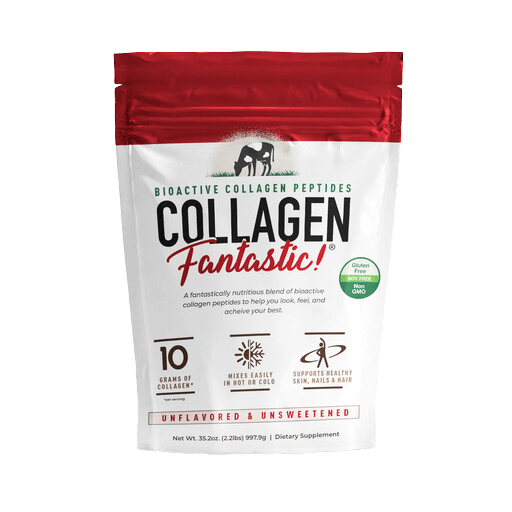Key Takeaways
-
Overtraining isn’t just physical — it affects energy, sleep, mood, and recovery.
-
Training hard is important, but recovering hard is where progress happens.
-
Early warning signs include fatigue, soreness that lingers, irritability, poor sleep, stalled progress, and increased cravings.
-
Adjusting intensity, improving sleep, and fueling properly can reverse overtraining quickly.
-
Whey Protein, Creatine Fantastic, and Collagen Fantastic support recovery, muscle repair, and tissue resilience — all essential when training intensity increases.
Introduction: The Hidden Side of “Working Hard”
If you care about your fitness, you probably care about effort. You push harder, stay disciplined, and aim for consistency — and that’s a good thing. But even the most dedicated people can run into a problem they don’t see coming:
Overtraining.
It sneaks up slowly. Workouts feel a little heavier. Recovery takes longer. Your motivation dips. You start wondering: Why am I doing everything right, but feeling worse — not better?
Overtraining isn’t about doing “too much exercise.” It’s about doing more than your body can recover from.
And the solution isn’t quitting — it’s learning to balance intensity with rest, nutrition, and smarter training choices.
Let’s break it down so you can recognize the signs early, reset when needed, and train in a way that supports long-term strength.
What Overtraining Actually Means
Overtraining happens when the stress of training exceeds your body’s ability to recover. It’s a mismatch between effort and recovery, not a sign of weakness or lack of discipline.
Think of it this way:
Training breaks your body down.
Recovery builds it back up stronger.
When recovery falls behind, progress stalls — or reverses.
Anyone can overtrain: beginners, experienced lifters, endurance athletes, and even casual exercisers who stay chronically fatigued.
Recognizing the signs early is the key to protecting your progress.
The Early Warning Signs of Overtraining
1. Persistent Fatigue That Doesn’t Improve With Rest
Feeling tired after a hard workout is normal. Feeling tired all the time — even after you sleep well — is not.
Overtraining taps into your body’s energy reserves and disrupts your nervous system, leaving you exhausted.
2. Soreness That Never Fully Goes Away
Mild soreness is part of training. But soreness that lingers for days, feels deep in the joints, or makes everyday movement harder is a sign your muscles aren’t recovering.
This is where nutrition matters — amino acids, creatine, and collagen all support faster repair so soreness doesn’t accumulate.
3. Declining Performance
You’re working harder but lifting less.
Your endurance is dropping.
Weights that were manageable now feel heavy.
This is one of the most reliable signs of overtraining — your body simply doesn’t have enough energy to adapt.
4. Poor Sleep
Overtraining elevates cortisol (your stress hormone), which can disrupt sleep cycles, cause nighttime waking, or make it difficult to fall asleep.
And lack of sleep only compounds the recovery problem.
5. Mood Changes, Irritability, or Anxiety
Your nervous system controls every aspect of training — strength, motivation, and calm. When it’s overworked, you feel on edge, impatient, and easily stressed.
This isn’t in your head. It’s physiological.
6. Loss of Appetite — or Unusual Cravings
Some people lose hunger cues completely. Others start craving sugar or carbs as the body looks for quick energy sources.
Both can signal a recovery system that’s overwhelmed.
7. Getting Sick More Often
Training stresses the immune system. Balanced recovery strengthens it.
Overtraining weakens it — making you more prone to colds, inflammation, or slow healing.
8. Stalled Progress
This includes:
-
Not gaining strength
-
Not building muscle
-
Not improving endurance
-
Feeling mentally “stuck”
More effort doesn’t always mean more progress — sometimes it means more strain.
Why Overtraining Happens (Even When You Think You’re Building Good Habits)
Most people overtrain not because they’re careless — but because they’re committed.
The most common reasons include:
• Training too frequently without rest days
• Not eating enough protein or total calories
• Not sleeping enough
• Doing too much high-intensity training
• Under-fueling morning workouts
• Stress outside the gym
• Poor recovery nutrition
• Increasing training volume too quickly
And for adults 40+, the risk increases because recovery naturally slows with age — meaning smart fueling becomes even more important.
The Science of Recovery: Where Progress Actually Happens
Recovery isn’t passive — it’s physiological.
When you rest, your body is:
-
Repairing damaged muscle fibers
-
Replenishing glycogen
-
Reducing inflammation
-
Rebuilding connective tissue
-
Restoring ATP energy
-
Rebalancing hormones
-
Strengthening the nervous system
You don’t get stronger during the workout.
You get stronger because you recovered from it.
This is why under-eating, poor sleep, or skipping post-workout nutrition significantly increases the risk of overtraining.
How to Fix Overtraining (Without Losing Progress)
1. Pull Back Intensity — Not Consistency
You don’t have to stop training altogether.
You simply need to shift your approach.
For 7–14 days:
-
Reduce heavy lifting by 30–50%
-
Shorten workouts
-
Swap high-intensity cardio for steady-state movement
-
Prioritize mobility, stretching, or walking
-
Slow down tempo instead of increasing weight
This keeps you active while giving your nervous system room to recover.
2. Increase Protein and Recovery Nutrition
When your body is stressed, its protein needs go up — not down.
Aim for:
-
0.8–1.0 grams of protein per pound of body weight daily
-
Protein evenly spaced across breakfast, lunch, dinner, and snacks
Fantastic Nutrition Whey Protein makes this easier by providing complete amino acids that support muscle repair, especially when appetite is low or recovery is lagging.
3. Use Creatine to Support Cellular Energy
Creatine helps your muscles replenish ATP — your body’s quick energy source.
This is crucial during recovery from overtraining because your muscles are depleted.
Creatine Fantastic combines clean Creapure® creatine monohydrate with myHMB® to:
-
Reduce muscle breakdown
-
Support strength maintenance
-
Improve recovery
-
Restore energy
This is exactly what an overworked body needs.
4. Support Joints and Connective Tissue
Overtraining doesn’t just stress muscles — it stresses the tissues that support them.
Collagen Fantastic provides the amino acids necessary for:
-
Joint stability
-
Tendon resilience
-
Ligament health
-
Faster tissue repair
This reduces the lingering aches that accumulate when intensity outpaces recovery.
5. Improve Sleep Quality
Aim for 7–9 hours of sleep.
Quality matters as much as quantity.
Simple strategies:
-
Limit screens 1 hour before bed
-
Keep your room cool and dark
-
Reduce late-day caffeine
-
Consume protein earlier in the evening to keep blood sugar stable
Good sleep is one of the quickest ways to resolve overtraining.
6. Hydrate More Than You Think You Need
Dehydration amplifies fatigue, soreness, and muscle breakdown.
Aim for:
-
Half your bodyweight in ounces of water daily
-
More on training days
-
Electrolytes if you sweat heavily
Hydration also helps creatine and protein work more effectively.
7. Listen to Your Body — Not Your Ego
Some days you’ll feel unstoppable, and some days you won’t.
Training through fatigue occasionally is fine.
Training through fatigue constantly is not.
Your best results come from a balance of challenge and recovery — not one or the other.
How to Prevent Overtraining in the Future
Once you’ve reset, you can prevent overtraining long-term by setting up a balanced training system.
1. Cycle Your Training Intensity
Alternate phases of heavy, moderate, and high-rep work.
2. Schedule Recovery on Purpose
Rest days should be intentional — not afterthoughts.
3. Fuel Before and After Workouts
Under-fueling is one of the biggest overtraining triggers.
4. Track Your Energy and Sleep
Your mood, energy, and rest will often warn you before your muscles do.
5. Include Deload Weeks
Every 4–8 weeks, reduce volume or load by 30–50% to reset your nervous system.
This keeps progress steady without burnout.
Frequently Asked Questions
1. How do I know if I’m actually overtraining or just tired?
If fatigue improves after a couple good nights of sleep, you were just tired.
If it persists for days or weeks, or your performance drops, you’re likely overtraining.
2. Can beginners overtrain?
Yes — especially if they jump into high-intensity classes or lift too heavy too fast without proper recovery.
3. Do I have to stop working out completely?
No. In most cases, reducing intensity and adding recovery is enough to reset the system.
4. How long does it take to recover from overtraining?
Mild overtraining improves in 1–2 weeks.
More severe cases may take 3–6 weeks, depending on sleep, nutrition, and stress.
The Bottom Line
Overtraining doesn’t happen because you’re undisciplined — it happens because you care.
The fix isn’t quitting. It’s recalibrating.
Strength isn’t built by pushing endlessly.
Strength is built by recovering deeply.
Fuel well.
Sleep well.
Train smart.
Recover intentionally.
And use tools that support your body — not stress it further.
Whey Protein, Collagen Fantastic, and Creatine Fantastic work together to repair muscle fibers, restore energy, and strengthen the connective tissues that support every rep.
That’s how you stay consistent — not for weeks, but for decades.











